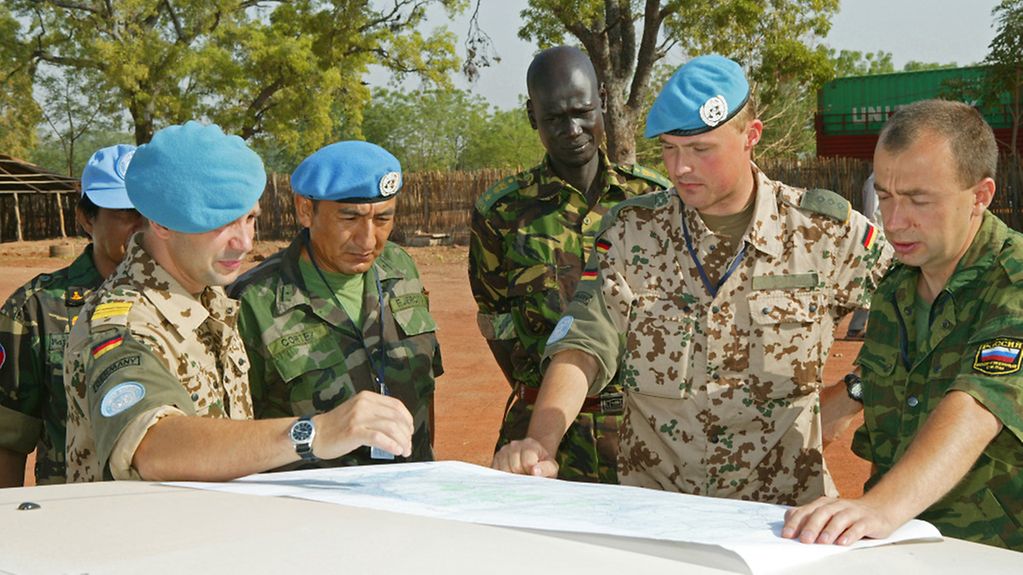Bundeswehr in Sudan and South Sudan
The Cabinet has decided to extend the Bundeswehr’s involvement in two UN missions in Sudan and South Sudan. The missions aim to bring peace, stability and security to the region. The government motion must still be approved by the German Bundestag.
3 min reading time

The two mandates provide for up to 50 soldiers to be deployed for each mission
Photo: Bundeswehr/Rott
The Bundeswehr is to continue to be part of the UN missions to support peace in Sudan (UNAMID) and South Sudan (UNMISS) until 31 December 2016.
The mandates provide for up to 50 soldiers to be deployed within the scope of each mission. At present eight German soldiers and one police officer are assigned to UNAMID’s headquarters in El Fasher in Sudan. Fifteen German soldiers and ten police officers are currently supporting UNMISS (United Nations Mission in the Republic of South Sudan).
Peaceful coexistence of the two states
The German government has long been involved in efforts to resolve the conflict on a permanent basis and consolidate peace in South Sudan and the region. Efforts are also ongoing as part of the EU’s Common Foreign and Security Policy, and the political activities of the African Union and the United Nations. The aim is to settle the still outstanding disputes between Sudan and South Sudan, and thus to enable the two states to coexist in peace.
Alleviating the humanitarian emergency in South Sudan
Four years after gaining independence, South Sudan still faces massive challenges. On 15 December 2013 heavy fighting broke out. Since then the security situation in parts of the country has deteriorated dramatically. Fighting has triggered a humanitarian emergency and further worsened the economic situation in South Sudan.
About 4.6 million people are dependent on food aid, and around 2.2 million have been forced to leave their homes and now live as displaced persons within South Sudan, or have fled the country for neighbouring states. Almost 200,000 internally displaced persons are currently living in UNMISS facilities alone.
To alleviate the suffering of refugees and internally displaced persons, the German government has provided more than 34 million euros over the last two years to finance humanitarian aid measures.
In South Sudan and the neighbouring countries, measures worth 47 million euros are being implemented to help South Sudanese displaced persons and refugees within the scope of the special initiative "Tackling the root causes of displacement, reintegrating refugees". Germany’s development cooperation has so far helped more than two million people.
Political solution to the Darfur conflict
The situation in Darfur remains tense and unstable. Violent clashes continue to erupt between government and rebel troops and ethnic groups. High crime levels are putting further strain on the precarious humanitarian situation of the civilian population.
In spite of the 2011 Doha peace agreement, it has not yet proved possible to bring peace to the region. The UNAMID mission is endeavouring to improve the security situation in Darfur and is indispensable as a stabilising element.
At the reconstruction conference for Darfur held in Doha on 7 April 2013, Germany pledged funding of 16 million euros. This is to be used to finance a vocational training project as of the end of 2015.
Basis in international law
On 8 July 2011, under Germany’s Presidency, the United Nations Security Council adopted Resolution 1996 (2011) which established a UN mission in South Sudan (UNMISS, the United Nations Mission in the Republic of South Sudan). On 9 October the Security Council extended the mandate until the end of December 2015.
On 31 July 2007 the UN Security Council adopted Resolution 1769 (2007) which established the UNAMID Mission (African Union/United Nations Hybrid operation in Darfur). On 29 July 2015 the mandate was extended by another twelve months to run until 30 June 2016.